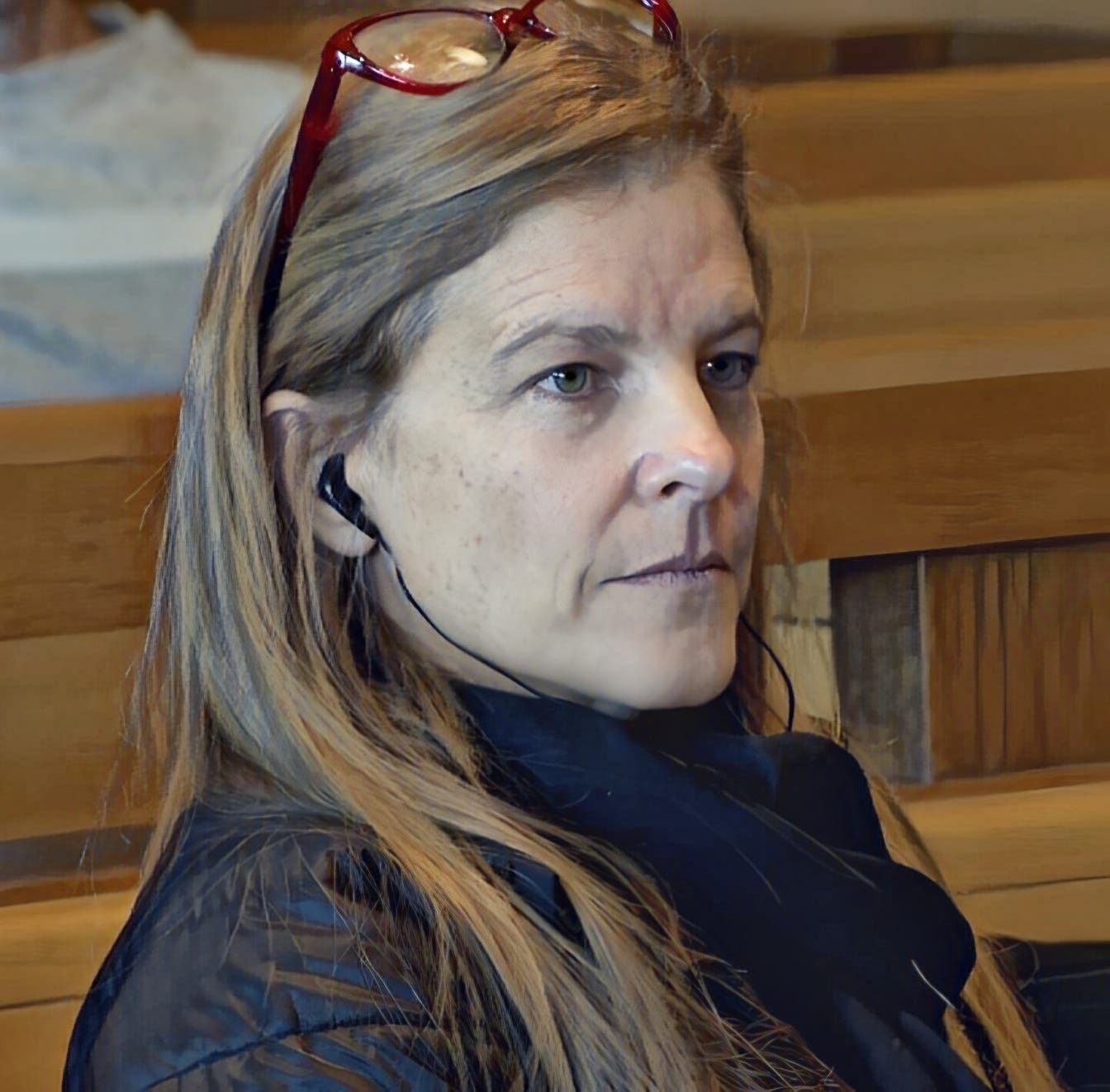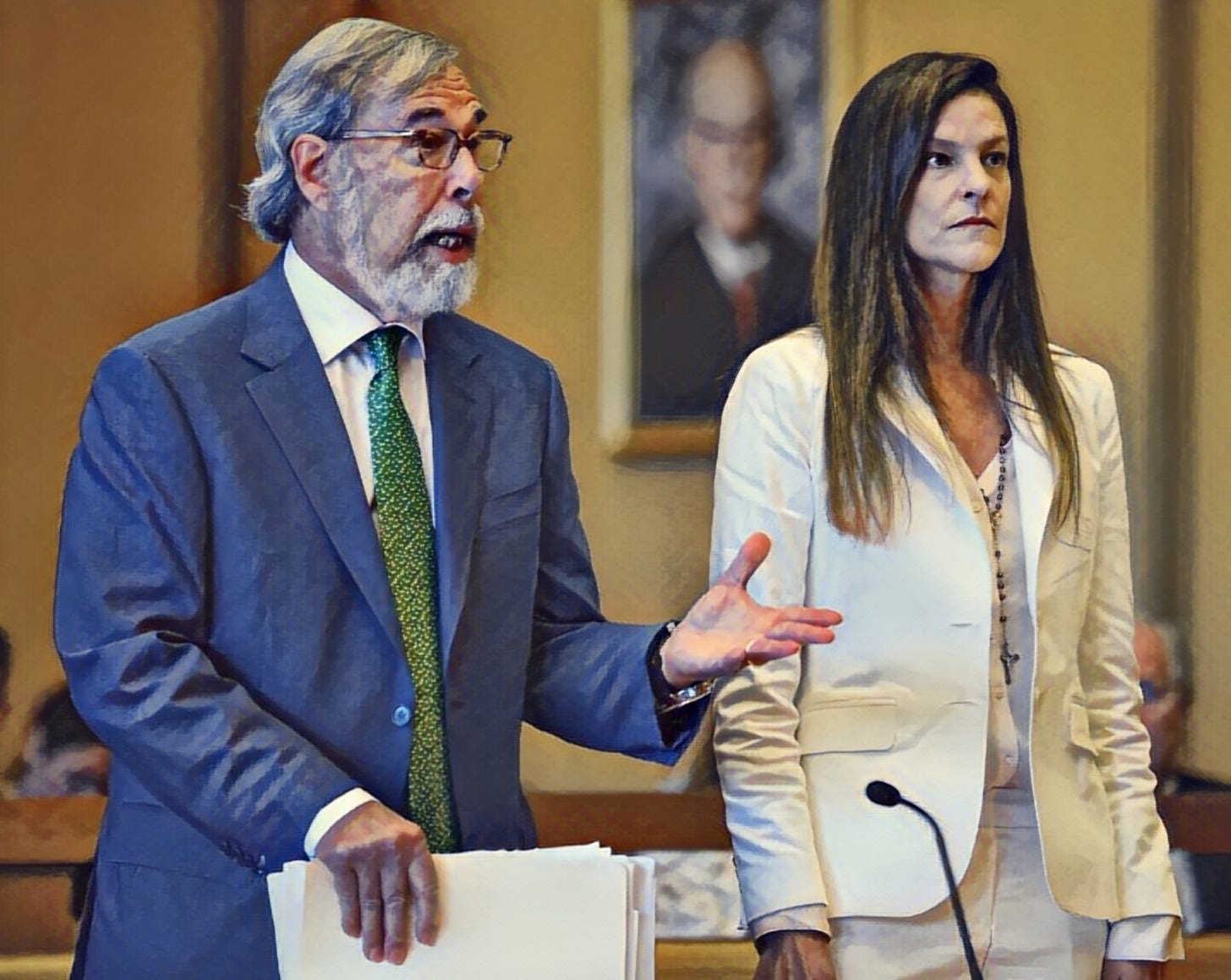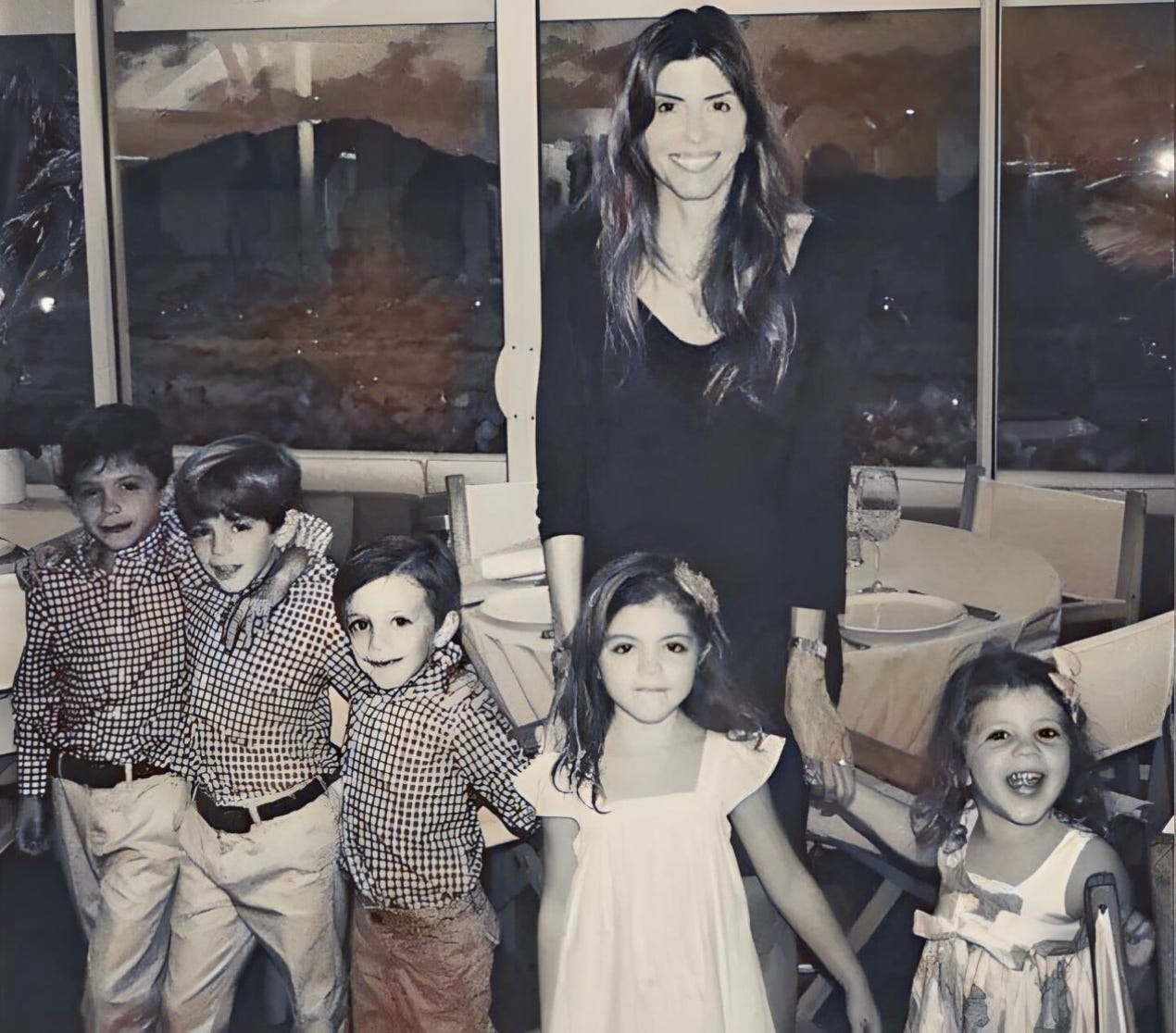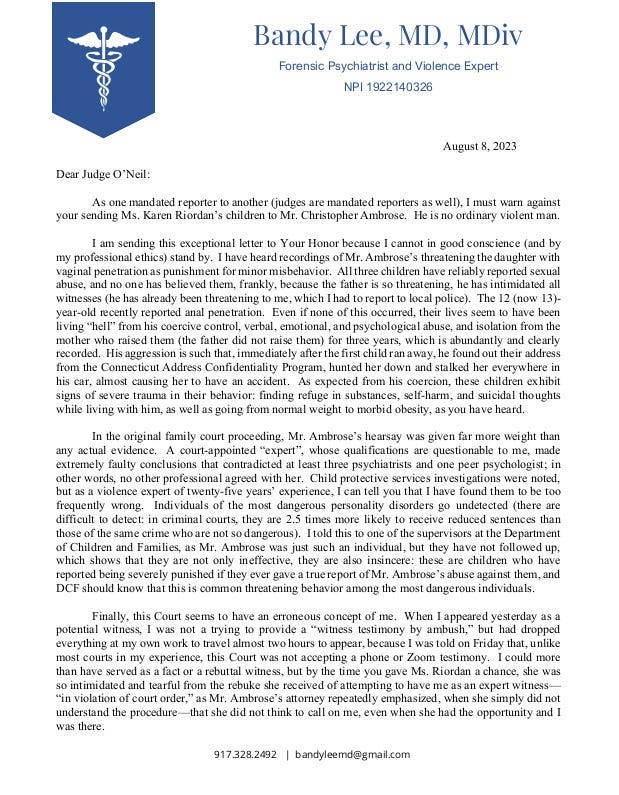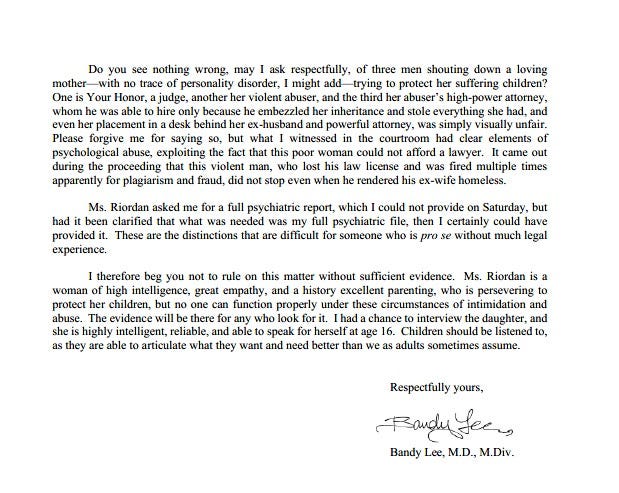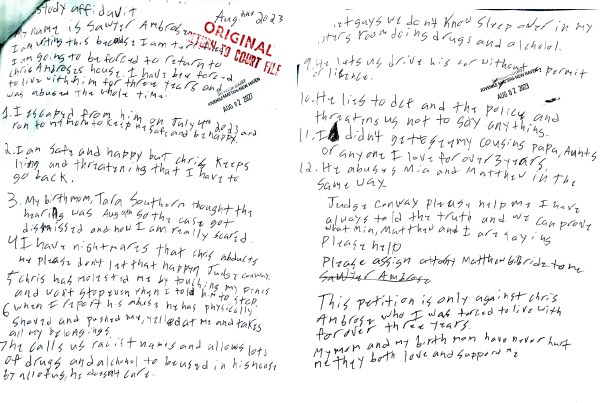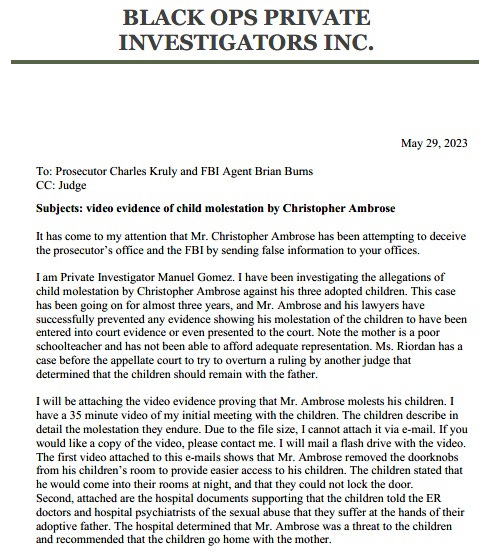The Tragic Tale of Jennifer Dulos and the Connecticut Law That Bears Her Name
Fotis Dulos and Michelle Troconis: The Faces of a Love Affair That Spiraled Into a Nightmare for Jennifer Dulos.
By Richard Luthmann
On a seemingly ordinary day, May 24, 2019, Jennifer Dulos, a 50-year-old mother of five, vanished. Her disappearance ignited a fervor and national attention not often seen in the peaceful town of New Canaan, Connecticut. Her last known act was the simple, everyday task of dropping her children at school.
Jennifer's life mirrored the idyllic image of suburban excellence to the outside observer. Yet, beneath this facade, the currents of her life ran tumultuously. Marked by a marriage dissolving into anger and fear, all the evidence in Jennifer's disappearance pointed to Fotis Dulos, her husband, and Michelle Troconis, his paramour.
Fotis Dulos's life, once filled with promise, spiraled into tragedy following Jennifer's disappearance. Charged with heinous crimes, he never faced his day in court. His death by suicide in January 2020 left a note proclaiming his innocence and absolving his inamorata of any involvement, marking a bleak and controversial end to his story.
Troconis emerged as more than just Fotis Dulos's romantic partner; she became a crucial figure in an affair that spiraled into a scenario much graver than anyone could have anticipated. Her involvement escalated into severe allegations, indicative of a love triangle that had gone fatally wrong.
Michelle Troconis now stands trial in Stamford, Connecticut, facing charges including conspiracy to commit murder, tampering with evidence, and hindering prosecution. She faces up to 20 years in prison if convicted; thus, getting a good criminal and/or Westport Divorce Lawyer is likely a solid legal strategy.
As the details of Jennifer's life and subsequent disappearance came to light, they not only captivated the public but also sparked significant legal discourse and reform. Jennifer Dulos's story and the equally tragic tale of Jennifer Mangano became the catalyst for "Jennifers Law" in Connecticut. This groundbreaking legislation expanded the definition of domestic violence, acknowledging the often unseen and insidious nature of coercive control.
However, Jennifers Law's implementation stirred controversy. Some legal scholars and activists raised the alarms about the legislation while it was being formulated. Advocates fear that the intent of Jennifer's Law has been and will continue to be "twisted," actually harming victims in similar situations to Jennifer Dulos. These worst fears are realized in recent Connecticut cases such as Ambrose v. Riordan.
This article looks at the tragedy surrounding Jennifer Dulos's death and the further tragedies suffered by her family and by Connecticut victims of abuse under the auspices of the law that bears her name.
A Family Shattered
The vanishing of Jennifer Dulos left behind a void filled with unanswered questions. The Dulos household, once a symbol of a prosperous family life, became the center of national attention. The truth exposed was a reality distorted by fear and marital discord.
"I am afraid of my husband," Jennifer had stated in a court filing, revealing the extent of the marital strife and fear she faced.
Long before her disappearance, the seeds of discord had been sown. Her marriage to Fotis Dulos was a union that began at Brown University and blossomed into a family with five children. It gradually devolved into a legal battleground.
The divorce proceedings were dense with accusations and fear, painting a grim picture of their once-happy life. Fotis, a man of Greek descent and a home builder by trade, clashed with Jennifer, leading to a contentious legal struggle involving over 300 motions.
Fotis's romantic relationship with Michelle Troconis added an element of scandal. Troconis would later face grave accusations relating to Jennifer's disappearance. She emerged as a central figure in the unfolding drama, the public watching fascinated and horrified as the tragedy of the Dulos family unfolded.
The Estranged Husband: Fotis Dulos
The tale of Fotis Dulos and Jennifer began with promise. Their relationship was kindled in the hallowed halls of academia. Fotis Dulos, a Greek-American home builder, first crossed paths with Jennifer at Brown University. Their relationship blossomed over time, culminating in a wedding in 2004.
Initially, their marriage was a harmonious blend of love and ambition. However, as time marched on, the façade of success crumbled.
Fotis, known for his flashy lifestyle and competitive nature, faced mounting financial pressures. Despite the outward appearance of a thriving business as the founder of Fore Group Inc., a luxury home builder in Farmington, Connecticut, Fotis was battling significant financial woes. Reports indicated that he had accrued nearly $7 million in debt, a stark contrast to the prosperous image he projected.
Behind the walls of their sprawling home, the couple's relationship was unraveling. The divorce records revealed a marriage fraught with conflict and isolation. Jennifer, once the cornerstone of a seemingly happy family, testified about the strains in their relationship, including Fotis's frequent absences and allegations of mental health issues.
The breaking point came when Jennifer discovered Fotis's affair with Michelle Troconis, leading to her filing for divorce in 2017.
The divorce was tumultuous. The proceedings between Jennifer and Fotis Dulos became a warzone, marked by over 300 motions filed. Jennifer’s filings expressed a palpable fear for her and her children's safety, painting a picture of a woman desperate to protect her family from a husband she no longer recognized.
Fotis's counterclaims, riddled with accusations and denials, added to the complexity of the legal fight, further entrenching the couple in a bitter dispute that seemed far from resolution.
Jennifer's growing fear and apprehension were evident in her legal motions, where she sought emergency custody orders for their five children. As stated in court documents, her concerns were not only for her well-being but also for the safety of her children, highlighting the depth of the crisis engulfing the family.
Michelle Troconis: The Lover Accused
Michelle Troconis's entrance into Fotis Dulos's life was more than a mere romantic interlude; it became a pivot point in a narrative that shook the very foundations of the Dulos family. Her affair with Fotis, amidst his marital strife, marked a transformation of a private conflict into a public spectacle and a complex love triangle.
With her background in horse riding therapy and television production, Troconis found her life entangled with Fotis Dulos and the tragic disappearance of his wife, Jennifer. Troconis was catapulted into the limelight, not just as the other woman but as a key suspect and accused conspirator.
Facing charges of conspiracy to commit murder, tampering with evidence, and hindering prosecution, Troconis’s role took a severe and dark turn. Her involvement in the case suggests a deep entanglement in events leading to Jennifer’s disappearance. Prosecutors now paint a picture of a love affair that had fatally spiraled out of control.
The Disappearance and Investigation
Jennifer's final act of dropping her children at school in New Canaan became the starting point of a perplexing disappearance. This ordinary task was the last confirmed sighting of Jennifer, setting off a chain of events that would capture national attention.
The investigation swiftly gained momentum when Jennifer failed to show up for several appointments. A search of her Welles Lane home revealed alarming signs. Blood stains, a bloody footprint, and evidence of an attempted clean-up were discovered in the garage, indicating a violent struggle.
This disturbing scene starkly contrasted the life Jennifer was known to lead, hinting at the gravity of her disappearance.
As the search intensified, evidence pointed towards Fotis Dulos, Jennifer's estranged husband. Surveillance footage unearthed a critical lead: Fotis was captured on camera disposing of garbage bags in Hartford, Connecticut. These bags, it was later determined, contained items with Jennifer's DNA, tying Fotis directly to her disappearance.
This evidence placed Fotis at the heart of the investigation, raising serious questions about his involvement. As more evidence surfaced, the case against Fotis also became one against his girlfriend, Michelle Troconis. Despite her assertions of innocence, Troconis found herself increasingly entangled. Her proximity to Fotis during the critical timeframe of Jennifer's disappearance made her a subject of scrutiny.
Fotis Dulos was charged with felony murder, murder, and kidnapping but never stood trial. In January 2020, before he could face justice, Fotis died by suicide. In his note, he maintained his innocence and absolved Michelle Troconis of involvement in Jennifer's disappearance.
The Trial
Michelle Troconis now stands trial in Stamford, Connecticut. She faces serious charges, including conspiracy to commit murder, tampering with evidence, and hindering prosecution. If convicted, she faces twenty years behind bars.
The trial commenced on January 11, 2024, drawing intense media coverage. Troconis, firmly proclaiming her innocence, confronted the charges head-on. In a pre-trial press conference, Troconis expressed unwavering faith in the justice system and her readiness for the trial.
“It's been 4 1/2 years since I was wrongly accused,” she declared.
In the courtroom, the prosecution began presenting compelling evidence. On the first day, jurors viewed body camera footage from the New Canaan Police Department, taken on May 24, 2019, the day Jennifer was reported missing. This footage provided a critical window into the early stages of the investigation, setting the tone for the trial.
On the second day of the trial, the jurors were shown images of Jennifer's purse, discovered next to her unlocked rental car. The purse's contents are meticulously detailed, including approximately $2,000 in cash, credit cards, ID, checks, insurance documents, keys, and a poignant picture of her five children.
Prosecutors underscored their argument that Jennifer, a devoted mother, would not voluntarily disappear.
Further, the trial continues to scrutinize surveillance footage capturing Fotis Dulos and Troconis on the night of Jennifer's disappearance. The footage shows them stopping at trash receptacles along Albany Avenue in Hartford, an act that becomes central to the case.
The prosecution alleges that garbage bags by Fotis contained clothing and other household items belonging to Jennifer, linking Troconis to the act.
Troconis's defense team challenges the prosecution's narrative as the trial progresses, questioning the strength of the evidence linking her to the crime. The ongoing trial continues to reveal intricate details of the case.
Troconis's role remains a subject of intense scrutiny. Each piece of evidence is dissected under the watchful eyes of the court, the jury, and the public.
The defense emphasizes the lack of direct evidence tying Troconis to the crime. They focus on discrediting the prosecution's claim of her involvement in a conspiracy to commit murder.
Troconis's presence and demeanor in court are under constant observation. She faces the possibility of a lengthy prison sentence if convicted. The stakes are high. Some observers await a verdict that could bring closure to one of recent memory's most perplexing and tragic cases. But not the Dulos family.
A Family That Wants Accountability and Answers, Not Closure
In the wake of the tragedy, the five Dulos children, including two sets of twins, found a new guardian in their maternal grandmother, Gloria Farber. Farber, facing the double tragedy of her daughter's disappearance and the ensuing legal drama, took on the role of primary caretaker, ensuring the children's well-being and continuity in their lives.
Beyond their immediate concerns, the Dulos children also became the subject of legal proceedings concerning their inheritance. The estate of Fotis Dulos closed in October following his death. Because of their late father's enormous debts, he left the children with only a few personal items from a safe deposit box.
Despite these challenges, the Dulos children were described as "thriving and doing well" by family spokesperson Carrie Luft.
“It has been more than four years and seven months since Jennifer Farber Dulos was murdered and disappeared. We, her family and friends, have waited patiently, understanding that the justice process moves slowly and deliberatively, especially given the disruption of a global pandemic. We remain deeply grateful to the state’s attorney’s office, the Connecticut State Police, and the New Canaan Police for their tireless dedication to this case and the related, ongoing criminal investigation," Luft said.
She continued, "As this trial begins, it is crucial to remember who is at the center: Jennifer, whose five children have lost their mother, and, as an eventuality, both parents. Jennifer’s family and loved ones have lost a loving daughter, sister, cousin, and lifelong friend. We do not seek closure, as nothing can bring Jennifer back. We hope that this trial provides for accountability and answers.”
Jennifer's Law: A Promise of Change
Jennifer Dulos's shocking disappearance and death led to a significant shift in Connecticut's approach to its legal landscape. "Jennifer's Law," named in her honor, was passed. The legislation marked a pivotal change in how domestic violence is defined and addressed in the state.
This law directly responded to the circumstances surrounding Jennifer's case, particularly her expressed fears for her and her children's safety during her tumultuous divorce from Fotis Dulos.
Jennifer's Law broadened the traditional definition of domestic violence to encompass coercive control. This expansion recognized that abuse can extend beyond physical violence, including tactics of intimidation, isolation, and manipulation that abusers use to exert power and control over their victims.
By acknowledging these non-physical forms of abuse, the law aimed to offer more comprehensive protection to victims.
A key aspect of Jennifer's Law was its implications for restraining orders, and family relations matters in Superior Courts. The law enabled victims experiencing coercive control to seek restraining orders, a legal tool that was previously limited to cases involving physical violence or the threat thereof.
This legislative change provided a new avenue for victims to seek protection and legal recourse. Many hoped that by recognizing the broader spectrum of abusive behaviors, the law would empower individuals in abusive situations to come forward and seek help.
However, the application of Jennifer's Law has come into question. The recent Ambrose v. Riordan case revealed the potential for its misuse.
Jennifers Law Misused?: The Ambrose v. Riordan Case

The Ambrose v. Riordan case is a stark example of how laws, even those with noble intentions, can be twisted. The Connecticut Family Court has perverted Jennifer Dulos's legal legacy meant to protect the vulnerable.
When it was in the legislative stages, experts and advocates raised concerns about the potential manipulation of Jennifer's Law to serve agendas contrary to its original intent. Karen Riordan, accused of coercive control against her children, faced the law's harsh edge, an apparent reversal of its intended purpose to protect victims of domestic violence.
In the interests of full disclosure, this reporter is engaged in a lawsuit against Christopher Ambrose captioned Luthmann v. Hanks et al., Ind. No. 100012/2024 (New York County Supreme Court, New York State). Ambrose has a pattern and history of tortious interference with the practice of journalism.
The Ambrose v. Riordan matter and the plight of teenagers Mia, Matthew, and Sawyer Ambrose, judicially rendered homeless runaways by the Connecticut Superior Court, was extensively covered by several outlets, including investigative journalist Frank Parlato of the Frank Report. In response, Ambrose sued Parlato. The case is pending in Connecticut federal court.
The Ambrose Children Silenced and "Coercive Control" Applied
Peter Szymonik, a constitutional and civil rights activist, has been closely following this unusual case. He initially opposed Jennifer’s Law, fearing it could be misused, as he believes it is in this case. Szymonik criticizes the legal tactics employed by Christopher Ambrose, particularly his use of the family court system to speak on behalf of his children, effectively silencing them and their mother.
"The teenage children effectively had their mouths duct-trapped shut and their hands tied behind their backs," Szymonik states, highlighting the irony of Ambrose, accused of harming his children, speaking for them in court.
Szymonik describes a concerning scenario where the three children, aged 13, 16, and 16, ran away from their father's home, citing abuse. They sought refuge with their mother and even obtained attorneys to file petitions in juvenile court. Despite this, Ambrose used the family court to pursue a series of legal actions against Riordan.
Szymonik points out, "Now, any time a parent is accused of criminally harming a child, all they have to do is run to 'family' court and file a motion on 'behalf of their child' to dismiss the criminal claims and complaints."
Riordan's ex-husband, Ambrose, a former Hollywood writer now fallen from grace for plagiarism, hired Attorney Alexander Cuda, the former President of the Connecticut Bar's Family Law Section. Attorney Cuda of the Needle Cuda law firm in Westport, Connecticut, had a strategy that included filing a Temporary Restraining Order (TRO) against Riordan, not on Ambrose's behalf, but on behalf of his 13-year-old son, using Jennifer’s Law as the basis.
The law, aimed at protecting victims of domestic violence like Jennifer Dulos, was here turned against the mother, accusing her of "coercive control." This move effectively muzzled the voices of the teenagers, who previously lived happily with their mother away from their allegedly abusive father.
In a controversial decision, Judge Thomas O'Neill ruled against Riordan, refusing to let the children be heard in court despite their active petitions before the juvenile court. O'Neill's orders did not specify how Riordan was to enforce the children’s return to their father or how she could comply with the order of protection without violating it.
Given the court's orders, Szymonik argues that Riordan cannot be reasonably faulted for the teenagers' actions. Connecticut Superior Court Judge Thomas J. O’Neill, who spent his legal career at Day Pitney LLP, labeled Riordan's conduct "domestic violence" when he granted the controversial Restraining Order in Bridgeport Family Court on August 8 of last year.
Consequently, Riordan, a special education teacher weighing 110 pounds, was barred from seeing her children - Mia, Matthew, and Sawyer, aged 16, 16, and 13, respectively - for a year. These teenagers, who had been living with Riordan, fled to their grandfather's out-of-state home, avoiding their father, Ambrose.
The decision to approach Judge O’Neill was strategic. Attorney Cuda, seeking a favorable interpretation of Jennifer’s Law for his wealthy client, found in O’Neill, a judge who used the law to separate Riordan from her children. These children had sought refuge with their mother from their allegedly abusive father. The children made multiple allegations of continuing abuse by Ambrose, including sexual penetration, the first claims being reported as early as 2020 to the Connecticut Department of Children and Families (DCF). These communications and reports remain in the possession of CT DCF and the Family Court.
In his ruling, Judge O’Neill agreed with Ambrose's claim that Riordan was using "coercive control" to influence the children's desire to live with her, a decision based solely on Ambrose's allegations without input from the teenagers.
It's important to note that Ambrose, not his children, initiated the legal action against Riordan. The children wanted to live with their mother and view their father as a violent threat.
Crucial Evidence and Expert Reports Ignored
Dr. Bandy X. Lee, M.D., M.Div. a prominent American psychiatrist, published a detailed account of the case of Christopher Ambrose, revealing severe allegations of abuse towards his children. In her 25-year career that involved work with the United Nations and teaching positions at Yale University Medical Center and School of Law, Dr. Lee emphasized the unique severity of this case. She observed that Ambrose, using the Connecticut Family Court system, was causing significant harm to his ex-wife Karen Riordan and their children.
Dr. Lee, who typically refrains from discussing clients, felt compelled to speak out due to the Court's refusal of her testimony, the client's permission, and the active danger to the children.
Her report portrayed Riordan as a stable, loving mother whom Ambrose unfairly victimized. Dr. Lee diagnosed Ambrose’s actions as “psychopathic” based on the Hare Psychopathy Checklist, where Ambrose scored 32/40, indicating a HIGH RISK of harmful behavior.
Dr. Lee's investigation uncovered Ambrose's manipulative and abusive actions, including emotional, psychological, physical, and sexual abuse towards his children. This abuse was so severe that it led to significant behavioral and psychological changes in the children.
Dr. Lee reported her concerns to the Connecticut DCF and the Court but found her warnings disregarded. She believes this reflects a systemic failure to protect the children. Dr. Lee criticized the Family Court for its handling of the case, highlighting the misuse of the "parental alienation" theory by Ambrose to continue his abuse and evade accountability.
Ambrose has engaged in serious abuse in many ways, according to Dr. Lee:
Litigation abuse and abuse of power - Riordan has no money or lawyer and is being beaten into submission. The children have no meaningful voice in the process.
Authority Bias - Racism, sexism, and classism. The poor mother and her brown-skinned children are at the mercy of the white, wealthy authority structures.
Witness Intimidation - Ambrose regularly and psychopathically intimidates witnesses, the press, and anyone he believes may reveal facts contrary to his spun narrative. This includes Dr. Lee, journalist Frank Parlato, and others.
Victim Reversal - Christopher Ambrose was never a victim. He uses the courts and his lawyers to victimize the real victims further, the Ambrose teenagers and their mother, Riordan.
Scapegoat - The lawyers, GALs, DCF workers, and other participants involved have allowed Christopher Ambrose to spin the tale that Riordan represents everything that is “wrong” with the CT Family Court system when, in fact, Ambrose is the physical embodiment of the problem.
Christopher Ambrose was previously found a “HIGH RISK” for domestic violence by Connecticut Court Attorney Allison Kaas, Esq. Judge O'Neill chose to disregard this evidence.
Additionally, as a mandated reporter, Dr. Bandy Lee raised the sirens about the sexual abuse of the Ambrose teenagers:
“I am sending this exceptional letter to Your Honor because I cannot in good conscience (and by my professional ethics) stand by. I have heard recordings of Mr. Ambrose’s threatening the daughter with vaginal penetration as punishment for minor misbehavior. All three children have reliably reported sexual abuse, and no one has believed them, frankly, because the father is so threatening, he has intimidated all witnesses (he has already been threatening to me, which I had to report to local police). The 12 (now 13)-year-old recently reported anal penetration. Even if none of this occurred, their lives seem to have been living “hell” from his coercive control, verbal, emotional, and psychological abuse, and isolation from the mother who raised them (the father did not raise them) for three years, which is abundantly and clearly recorded. His aggression is such that, immediately after the first child ran away, he found out their address from the Connecticut Address Confidentiality Program, hunted her down and stalked her everywhere in his car, almost causing her to have an accident. As expected from his coercion, these children exhibit signs of severe trauma in their behavior: finding refuge in substances, self-harm, and suicidal thoughts while living with him, as well as going from normal weight to morbid obesity, as you have heard.”
Christopher Ambrose is alleged to have threatened his sixteen-year-old daughter Mia Ambrose with vaginal penetration as punishment for minor misbehavior.
Dr. Bandy Lee, M.D., even filed a mandated Report of Suspected Child Abuse or Neglect:
Connecticut DCF admittedly did not investigate the allegation. They said it was “duplicative.”
The youngest child, Sawyer Ambrose, filed a petition with the Juvenile Division of the Superior Court alleging abuse by Christopher Ambrose:
4. I have nightmares that Chris [Ambrose] abducts me. Please don’t let that happen Judge Conway.
Chris has molested me by touching my penis and won’t stop even when I told him to stop.
When I report his abuse he has physically shoved and pushed me, yelled at me and takes all my belongings.
He calls us racsit names and allows lots of drugs and alcohol to be used in his house by all of us. He doesn’t care.
*****
He lies to DCF and the police and threatens us not to say anything.
*****
Judge Conway please help me. I have always told the truth and we can prove what Mia, Matthew, and I are saying.
Sawyer Ambrose corroborated Mia Ambrose’s allegation of sexual penetration and improper sexual conduct. Dr. Lee, a trained medical doctor, also confirmed these allegations. Connecticut DCF has possession of these filed court documents.
Days after the Sawyer Ambrose court filing, sixteen-year-old Matthew Ambrose, through his appointed counsel Matthew T. Gilbride, Esq., filed an amended petition with the Juvenile Division of the Superior Court alleging, among other things, sexual abuse by Christopher Ambrose:
On numerous occasions both prior and subsequent to April 26, 2022, the Respondent, Chris Ambrose, improperly touched the inner thigh and or breasts of the minor, Mia Ambrose;
On numerous occasions both prior and subsequent to April 26, 2022, the Respondent, Chris Ambrose, improperly touched the inner thigh and or breasts of the minor, Sawyer Ambrose;
The minor, Matthew Ambrose, is similarly situated as the minor children, Mia Ambrose and Sawyer Ambrose;
On numerous occasions both prior and subsequent to April 26, 2022, the Respondent, Chris Ambrose, utilized the derogatory and insensitive term of "Beaners" when speaking to, or about Mia Ambrose, Sawyer Ambrose and/or Matthew Ambrose;
On numerous occasions both prior and subsequent to April 26, 2022, the Respondent, Chris Ambrose, threatened to withhold and or use personal, local, state and/or Federal resources to intimidate and control the minor children Mia Ambrose, Sawyer Ambrose and/or Matthew Ambrose;
On numerous occasions both prior and subsequent to April 26, 2022, the Respondent, Chris Ambrose, utilized support services such as 211 and 911 to intimidate and cause fear in the minor, Matthew Ambrose;
Connecticut DCF has possession of these filed court documents, which state unequivocally that Ambrose has engaged in sexual abuse and improper touching and uses the authorities to intimidate the teenagers into silence.
NYC Private Investigator Manuel Gomez has been on the Ambrose v. Riordan case for over three years - pro bono. He minces no words: “Mr. Ambrose molests his children,” and he told this to the FBI and US Attorney for the Western District of New York:
“I will be attaching the video evidence proving that Mr. Ambrose molests his chidlren. I have a 35 minute video of my initial meeting with the children. The children describe in detail the molestation they endure. Due to the file size, I cannot attach it via e-mail. If you would like a copy of the video, pelase contact me. I will mail a flash drive with the video. The first video attached to this e-mail shows that Mr. Ambrose removed the dorrknobs from his children’s rooms to provide easier access to his children. The chidlren stated that he would come into their rooms at night, and that they could not lock the door. Second, attached are the hospiutal documents supporting that the chidlren told the ER doctors and hosptiual psychiatrists of the sexual abuse that they suffer at the hands of their adoptive father. The hosptial determined that Mr. Ambrose was a threat to the chidren and recommended that the chidlren go home with thier mother.”
Connecticut DCF has possession of this document and the referenced additional evidence, where PI Gomez unequivocally states that Ambrose has engaged in sexual abuse and improper touching. The sources include an interview interview of the children, direct video evidence of the children’s statements, and hospital personnel reports and statements.
Despite multiple reports by psychiatrists and medical professionals and "smoking gun" evidence that was ignored, the court's actions, influenced by Ambrose, led to the children enduring prolonged suffering and separation from their mother, one that continues to this day now they have been returned to his custody.
Recent developments in this case saw Attorney Cuda filing a contempt petition against Riordan, holding her responsible for the children's reluctance to live with their abusive father following the Court's decision to keep them away from her.
In the Ambrose v. Riordan case, a Connecticut mother remains powerless to protect her children from serious harm. The reason is not like Jennifer Dulos's plight, where the law didn't allow a victim of domestic violence recourse.
Instead, BECAUSE of Jennifer Dulos's memory, domestic violence perpetrators may now masquerade as victims if they have enough money and the right lawyers. This result cannot be what Jennifer Dulos would have wanted.
Jennifer Dulos Legacy: The Echoes of Tragedy
Jennifer Dulos's legacy, encapsulated in the enactment of Jennifer's Law, is powerful and contentious. While the law marks a significant step forward in recognizing and combating non-physical forms of domestic abuse, its application in cases like Ambrose v. Riordan has sparked debate and concern.
Jennifer Dulos's story is deeply personal and tragic. While the criminal justice system may convict Michelle Troconis if a jury of her peers finds her guilty, the family has already said that it won't bring Jennifer back. They want answers. And a conviction may not bring them.
This case underscores the ongoing battle for justice and reform within the legal system. Jennifer Dulos's story is not just a singular tragedy; it reflects broader societal issues surrounding domestic violence and the complexities of the legal response to such cases. The glaring problems with the subsequent implementation of the letter and spirit of Jennifer's Law highlight new challenges for victims.
Jennifer Dulos's legacy may be a stern reminder that laws designed to protect victims must be applied fairly and effectively in the pursuit of justice if they are to be applied at all.








